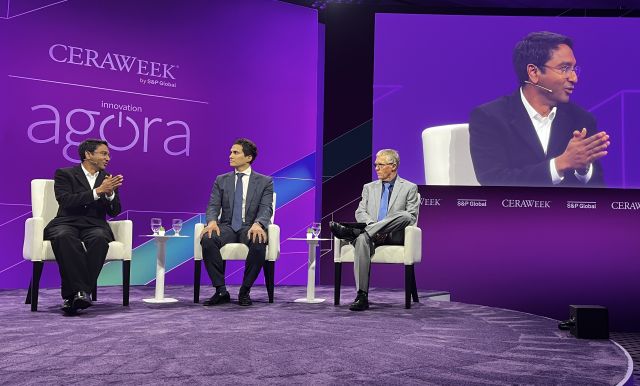
CERAWeek 2024
By: Jennifer Pallanich
Eventually, AI will change how the oil and gas industry works, but it’s hard to predict where it all leads. Some employees will enjoy more fulfilling jobs. Others may find they have no job at all.
AI has been promoted as a technology that will ease the drudgery of tasks such as coding software. Yet business have been slow on the uptake.
Experts say that makes sense, since there’s a risk to the tech’s impact on workflow.
As AI makes inroads, however, the expectation is that many jobs will change or disappear while others will emerge, experts said during a March 20 session on AI and work at CERAWeek by S&P Global.
Vivek Chidambaram, senior managing director at Accenture Strategy, said data and the right algorithms are a key part of successful AI applications. However, businesses so far are either hesitating or not biting.
“We are getting the technology right, we're taking the data, but actually getting adoption and changing the way a task gets done isn't so easy to accomplish,” he said.
The advent of generative AI, which communicates with humans through text and imagery, is helping frame how the software can be useful.
The availability of ChatGPT and other generative AI platforms have made that tech accessible to everyone, said Chase Lochmiller, Crusoe Energy’s co-founder and CEO.
Nevertheless, deploying the tech in the energy industry requires a return to a first principles approach. Companies should be thinking about what they do, what they need and why certain processes exist, he said.
As AI introduces new ways to get work done, “reconsidering that from a very first principle basis in terms of how your workforce operates and runs” is necessary, he said.
AI can seem disruptive, changing the fabric of how businesses work or are organized to accomplish tasks.
“If you think of how work is organized, you have an expert with a certain domain experience doing a portion of a process, passing that information to a different portion of the process, and a different expert adds to it and so on and so forth until you get a product or a service that is valuable to society,” Chidambaram said.
But company’s should approach AI as a way to augment a workforce, he said.
“You say, ‘No, no, no, let me find a use case that will help a certain portion of it,’ with no regard for the rest of the system that is going to be influenced by that use case,” Chidambaram said. “These, I would say, are some of the fundamental things that we have seen as we have deployed cases.”
In a 2023 survey, business leaders indicated the two primary obstacles to implementing AI: the rigidity of their current operating systems and uncertainty about skills, said Mike Bleadorn, senior client partner at Korn Ferry.
“We don't really know if we've got the skills to be able to put this into play. And so it creates a quandary,” he said. “You need to get in and get involved to be able to understand how it's going to impact and improve. What you're trying to do within your business?”
Chidambaram said leaders need to roll up their sleeves and work with AI. While author Malcolm Gladwell popularized the idea that 10,000 hours of practice results in expertise, Chidambaram said leaders need far less experience to lead effectively.
“About 1% to 2% of that time is the minimum amount of time that you need to put in as a leader, otherwise you're simply not in the game. The same sort of thing has to apply to the rest of the organization,” he said.
AI omnipotence
Because the overall AI landscape can be overwhelming, Lochmiller suggested narrowing a company’s focus to trying some low-hanging fruit.
“If you're a software company, there's a lot of great tools that are developed around AI, things like Copilot or MagicAI that actually transform the productivity of your software engineering workforce and can take your 1X engineers and turn into the mythical 10X Silicon Valley engineers,” he said.
Lochmiller said AI’s potential is compared to the ubiquity of electricity.
“What is electricity good for? It's good for everything,” he said. Benjamin Franklin, with his kite electricity experiments, “could have never imagined how electricity would transform every single industry from agriculture, healthcare, transportation and let alone creating and catalyzing development of new industries.
“You couldn't even possibly imagine the notion of the semiconductor industry when he was doing this experiment.”
To gain a foothold, companies should use AI to get started with something concrete and actionable.
And as with electricity lines, over time, Chidambaram said the infrastructure needed to allow AI to become part of the fabric of workforce will be built.
AI as ‘Darwinian event’
Chidambaram noted that throughout history, technology has destroyed some jobs and created others. AI, he said, will probably create jobs “we can’t comprehend.”
Lochmiller is optimistic about AI’s effect on humanity.
“I definitely view it as more friend than foe. I think there's a lot of talk around AI taking people's jobs, but I'm sort of the opinion that AI can be a catalyst for the greatest job-creating event in the history of humanity,” he said. “When we invented the tractor, it might have taken some farming jobs, but it freed up human capacity to go pursue other interests and higher leverage, more productive things for society.”
He expects AI to create a massive opportunity for the economy as well as blue and white collar work. Prompt engineering, for instance, is expected to be a growth field.
“There's a bit of an art in terms of getting the results you want out of AI solutions, and I think there's going to be quite a bit of workforce training in terms of driving those results,” Lochmiller said.
He also expects capitalism to drive adoption of AI technologies.
“If you don't adopt fast enough, your competitors will,” he said.
And the change is definitely coming, he said.
“We're sort of facing … a Darwinian event for corporations in terms of the genie's not going back in the bottle. We've broken through this level of productivity gains that people are able to get from AI, and it's at a moment of rapid exponential increase in the development of this technology,” Lochmiller said.
Link to original Hart Energy article: https://www.hartenergy.com/exclusives/ai-oil-revolutions-coming-tech-adoption-remains-tentative-208723
Write to Jennifer Pallanich at [email protected].


